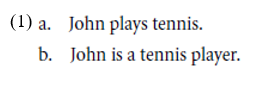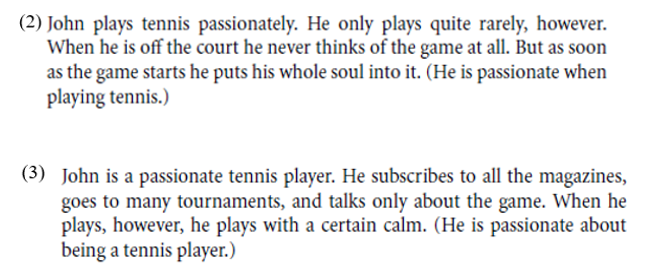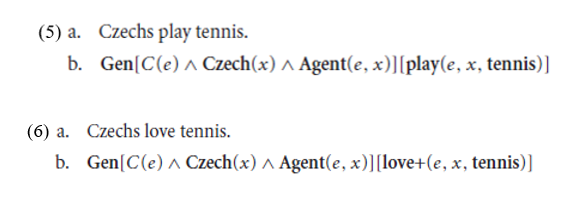


 Grammar
Grammar
 Tenses
Tenses
 Present
Present
 Past
Past
 Future
Future
 Parts Of Speech
Parts Of Speech
 Nouns
Nouns
 Verbs
Verbs
 Adverbs
Adverbs
 Adjectives
Adjectives
 Pronouns
Pronouns
 Pre Position
Pre Position
 Preposition by function
Preposition by function 
 Preposition by construction
Preposition by construction
 Conjunctions
Conjunctions
 Interjections
Interjections
 Grammar Rules
Grammar Rules
 Linguistics
Linguistics
 Semantics
Semantics
 Pragmatics
Pragmatics
 Reading Comprehension
Reading Comprehension
 Teaching Methods
Teaching Methods|
Read More
Date: 2025-03-26
Date: 2025-04-08
Date: 10-1-2022
|
Event-related modifiers
In many contexts the habitual sentence (1a) is synonymous with the generic (1b).

When modified by the adverb passionately, however, a subtle contrast in meaning becomes evident. The habitual has only what we might call the “event-related” reading, made salient in the discourse in (2), while the generic has also what we might call the “state-related” reading, made salient in the discourse in (3).

In the one case, then, the adverb appears to specify something about individual tennis-playing events themselves: each tennis game is carried out in a passionate way. If we adopt a quantificational account of habituals, of the sort proposed by Diesing (1992) and Kratzer (1995) on which habitual sentences involve a sort of quantification over underlying events, then we can think of the adverb as taking narrow scope with respect to this quantificational operator. This is indicated in (80b).1

Essentially this says that every relevant event of tennis-playing by John is a passionate event. We should note that on the Diesing/Kratzer conception, representations such as that in (4b) are not syntactic representation, but rather a post-LF level of interpretation – perhaps the level of Discourse Representation or some other conceptual level.
On the most natural reading of the first sentence of (3), however, it isn’t the tennis games that are carried out passionately, but something else: John is passionate about being a tennis player. Let us consider briefly what this might mean. As suggested above, the passion finds its expression in activities that are associated with being a tennis player, but these aren’t (necessarily) playing tennis. They can be events of traveling to tournaments, subscribing to magazines, etc. In other words the events that distinguish someone who might be characterized as a tennis player from someone who merely plays tennis. It is these events that are carried out with passion.
Let us explore one way of turning this observation into an analysis. Chierchia (1995) has argued that generic predicates such as love and know (Carlson’s (1977) Individual-level predicates) should be given a quasiquantificational analysis along the lines of that just sketched for habituals. Both habituals and generic predicates induce a quasi-universal reading of their bare plural subjects – as illustrated in (5) and (6). One of Chierchia’s desiderata is to derive this by providing both kinds of sentences with the same kind of semantic structure.

In both (5) and (6), the free variable introduced by the bare plural subject is bound by the quasi-universal Gen operator, and this is what gives rise to the quasi-universal reading. The difference between these sentences, of course, is what is in the nuclear scope. For habitual predicates it is clear that we are talking about events of playing tennis and so the event predicate play is what is in the nuclear scope. For generic predicates although the claim is that there is quantification over events, there does not appear to be a lexicalized event predicate which is analogous to play. Chierchia’s important innovation was to hypothesize a non-lexicalized underlying event predicate (here love+), which behaves in the semantic representation analogously to play and which appears in the nuclear scope in (6). This hypothesized predicate is intended to be one that holds of events related to the loving of tennis, such as going to watch games, playing tennis, talking about tennis, etc. And the intuition that this proposal attempts to capture is that to claim that someone loves something is to claim something about the kinds of event that they participate in.
Conceptually there is much to be said for this interpretation. Certainly to determine whether someone loves tennis we observe the range of events that they participate in, and it is from this observation that we draw our conclusion. Likewise, if we are told that Peter loves Mary, we expect there to be a range of events that Peter engages in which reflect this.2 Given such an account of the semantic interpretation of love, it is fairly clear how to treat manner modification. It should be treated along the same lines as manner modification of habitual predicates: that is, the predicate is simply interpreted as occurring in the nuclear scope as a conjoined event predicate. This isillustrated in (7).

What (7b) means, then, is that the relevant events associated with love of which Peter is the Agent and Mary the Theme are passionate. This certainly seems a reasonable interpretation of what it means to love someone passionately.3
This, of course, is all highly speculative. In some ways it is a way of making concrete the claim that the use of manner verbs when combined with state verbs is, in a sense, metaphorical. There is no passionate state, but rather there are passionate events that are closely related to certain states, and we can use adverbials to call up these passionate events, even when talking about states.
1 Gen is taken to have something like universal force (see Krifka et al. 1995), and – like a quantificational adverb – is taken to bind the free variables in its scope. The predicate C is a contextual restriction (of the sort argued for by von Fintel 1994) restricting the quantification to a relevant domain.
2 Common-sense folk-psychology is, in a sense, exactly this approach (Lewis 1972).
3 This analysis bears a number of similarities to the analysis of subsective adjectives (Siegel 1976a) proposed by McNally and Boleda (2004).
|
|
|
|
دراسة: حفنة من الجوز يوميا تحميك من سرطان القولون
|
|
|
|
|
|
|
تنشيط أول مفاعل ملح منصهر يستعمل الثوريوم في العالم.. سباق "الأرنب والسلحفاة"
|
|
|
|
|
|
|
المجمع العلمي يقيم دورة تطويرية عن أساليب التدريس ويختتم أخرى تخص أحكام التلاوة
|
|
|